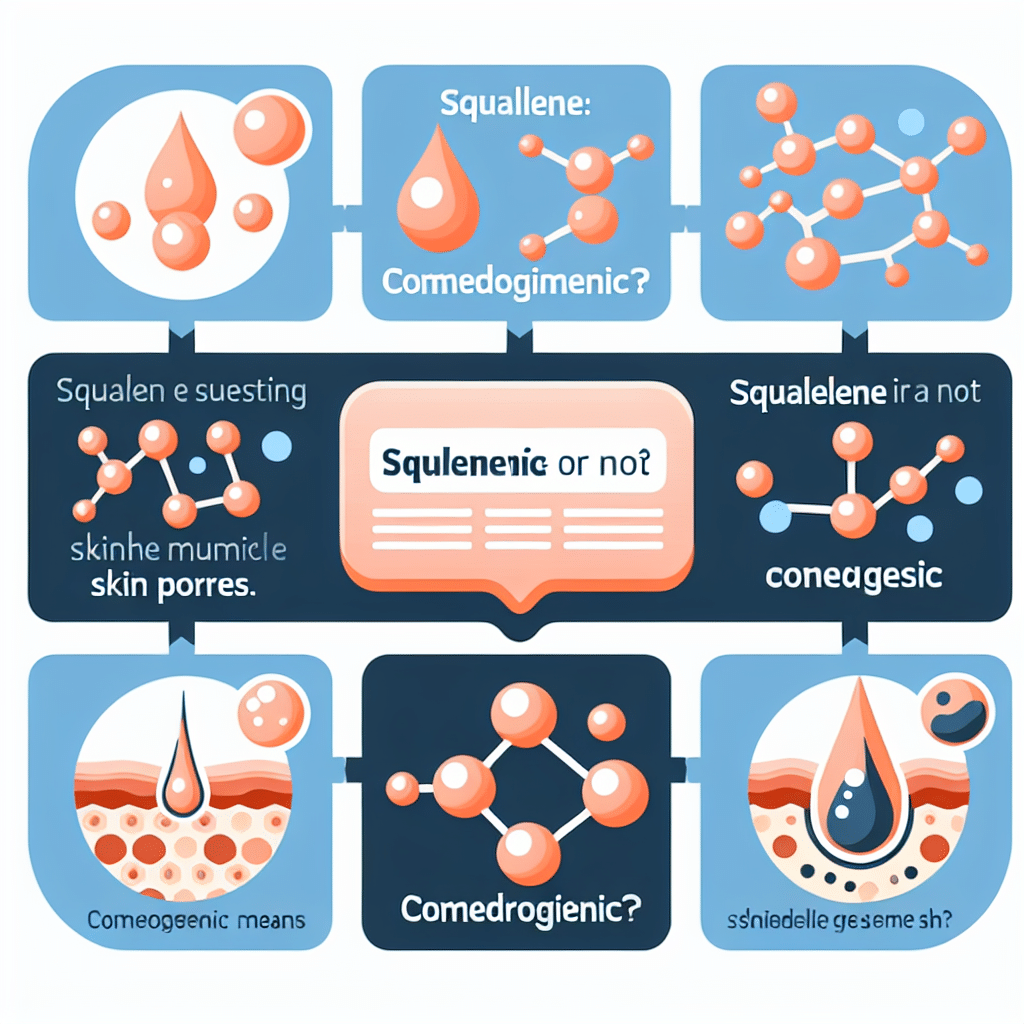Is Squalene Comedogenic? Find Out Here
-
Table of Contents
- Is Squalene Comedogenic? Uncover the Truth Here
- Understanding Squalene and Its Role in Skincare
- Comedogenicity: The Scale and Where Squalene Stands
- Factors Influencing Comedogenicity
- Research and Case Studies on Squalene’s Comedogenicity
- Comparing Squalene with Other Oils and Ingredients
- How to Use Squalene in Your Skincare Routine
- Conclusion: Squalene’s Place in Acne-Prone Skincare
- Discover ETprotein’s Premium Protein Products
Is Squalene Comedogenic? Uncover the Truth Here

When it comes to skincare ingredients, the term “comedogenic” can often be a source of confusion and concern. Comedogenic substances are those that have a tendency to clog pores and potentially lead to acne. As consumers become more ingredient-savvy, understanding the comedogenicity of components like squalene is crucial. In this article, we delve into the science behind squalene, its uses in skincare, and whether it poses a risk of clogging pores.
Understanding Squalene and Its Role in Skincare
Squalene is a natural hydrocarbon that is present in the skin’s lipid barrier, playing a vital role in maintaining moisture and protecting the skin against environmental stressors. It is also found in various natural sources, such as olives, rice bran, and shark liver. However, due to ethical and sustainability concerns, plant-derived squalene is the preferred choice in skincare formulations.
In the beauty industry, squalene is lauded for its emollient properties, which help to soften and smooth the skin. It is also an antioxidant, which means it helps to neutralize free radicals that can lead to premature aging. Because of these benefits, squalene is a popular ingredient in moisturizers, serums, and facial oils.
Comedogenicity: The Scale and Where Squalene Stands
The comedogenic scale is a rating system that ranges from 0 to 5, with 0 being non-comedogenic and 5 being highly comedogenic. This scale helps consumers and formulators determine the likelihood of an ingredient to clog pores.
Studies on squalene’s comedogenicity have yielded mixed results, but the consensus is that squalene is generally non-comedogenic or has a very low comedogenic rating. This means that for most people, squalene is unlikely to clog pores or cause acne.
Factors Influencing Comedogenicity
It’s important to note that comedogenicity can be influenced by several factors, including:
- Concentration: The amount of squalene in a product can affect its comedogenic potential.
- Formulation: Other ingredients in the product can interact with squalene, altering its effects on the skin.
- Individual Skin Type: People with oily or acne-prone skin may be more sensitive to comedogenic substances.
- Purity: Highly refined squalene is less likely to contain impurities that could contribute to comedogenicity.
Research and Case Studies on Squalene’s Comedogenicity
Several studies have investigated the comedogenicity of squalene, with most indicating that it is unlikely to cause pore blockages. For instance, a study published in the Journal of Cosmetic Science evaluated the comedogenicity of various plant oils and found squalene to have a low potential for clogging pores.
Case studies involving individuals with acne-prone skin have also shown that products containing squalene did not exacerbate their condition. In fact, due to its moisturizing and soothing properties, squalene may help to improve the overall texture and health of the skin.
Comparing Squalene with Other Oils and Ingredients
When compared to other oils and ingredients commonly used in skincare, squalene stands out for its lightweight and non-greasy feel. Unlike heavier oils like coconut oil, which has a higher comedogenic rating, squalene is quickly absorbed and less likely to leave a residue that could clog pores.
How to Use Squalene in Your Skincare Routine
To incorporate squalene into your skincare routine safely, consider the following tips:
- Choose products with high-quality, plant-derived squalene.
- Start with a low concentration and observe how your skin reacts.
- Look for non-comedogenic labels on products containing squalene.
- Consult with a dermatologist if you have concerns about acne or sensitive skin.
Conclusion: Squalene’s Place in Acne-Prone Skincare
In conclusion, squalene is generally considered to be non-comedogenic or low on the comedogenic scale, making it a suitable ingredient for most skin types, including those prone to acne. Its hydrating and antioxidant properties can be beneficial in maintaining healthy skin. However, as with any skincare ingredient, individual experiences may vary, and it’s essential to pay attention to how your skin responds to products containing squalene.
For those looking to explore the benefits of squalene without the worry of clogged pores, high-quality skincare formulations that feature this ingredient can be a valuable addition to your beauty regimen.
Discover ETprotein’s Premium Protein Products
If you’re interested in enhancing your health and wellness routine, consider exploring ETprotein’s range of protein products. Their offerings include a variety of organic, non-GMO, and allergen-free proteins that cater to diverse dietary needs and preferences. With a commitment to quality and purity, ETprotein is a trusted source for all your protein requirements.
About ETprotein:
ETprotein, a reputable protein and L-(+)-Ergothioneine (EGT) Chinese factory manufacturer and supplier, is renowned for producing, stocking, exporting, and delivering the highest quality organic bulk vegan proteins and L-(+)-Ergothioneine. They include Organic rice protein, clear rice protein, pea protein, clear pea protein, watermelon seed protein, pumpkin seed protein, sunflower seed protein, mung bean protein, peanut protein, and L-(+)-Ergothioneine EGT Pharmaceutical grade, L-(+)-Ergothioneine EGT food grade, L-(+)-Ergothioneine EGT cosmetic grade, L-(+)-Ergothioneine EGT reference grade and L-(+)-Ergothioneine EGT standard. Their offerings, characterized by a neutral taste, non-GMO, allergen-free attributes, with L-(+)-Ergothioneine purity over 98%, 99%, cater to a diverse range of industries. They serve nutraceutical, pharmaceutical, cosmeceutical, veterinary, as well as food and beverage finished product distributors, traders, and manufacturers across Europe, USA, Canada, Australia, Thailand, Japan, Korea, Brazil, and Chile, among others.
ETprotein specialization includes exporting and delivering tailor-made protein powder and finished nutritional supplements. Their extensive product range covers sectors like Food and Beverage, Sports Nutrition, Weight Management, Dietary Supplements, Health and Wellness Products, and Infant Formula, ensuring comprehensive solutions to meet all your protein needs.
As a trusted company by leading global food and beverage brands and Fortune 500 companies, ETprotein reinforces China’s reputation in the global arena. For more information or to sample their products, please contact them and email sales(at)ETprotein.com today.














